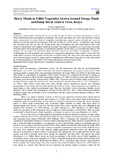Heavy Metals in Edible Vegetables Grown Around Sewage Ponds and Damp Site in Eldoret Town, Kenya
Abstract
Exposure to heavy metals including Ni, Cd, Cr, Co, Pb, As, Hg, Zn and Cu, has been recognized as a risk to human health through the consumption of vegetables. This study investigates the source and magnitude of heavy metal contamination in various kinds of vegetables including kales, spinach, carrot, cabbage and tomato in Eldoret town. In the study the concentrations of Pb, Cd, Ni, Mn, Co, Cu, Fe and Zn in vegetable crops around the municipal damp site and near the sewage ponds were investigated; and their contamination status with respect to international food standard guidelines evaluated. The lead in vegetables in all tested areas had higher level than that of the permissible limits of international standards. Except lead, it is concluded that nearly all the samples did not exceed the Intentional Food Standards maximum level (ML) in vegetables in Eldoret.
Contaminated soil and vegetables may contribute to a progressive gathering of these metals in food chain that might affect ecosystem with possible noxious effect on human health. The study shows that vegetables growing soil containing higher amount of metals could be transferred into edible parts of the plant, so study area should be monitored regularly to avoid health risk of human being due to exposure of toxic level.

